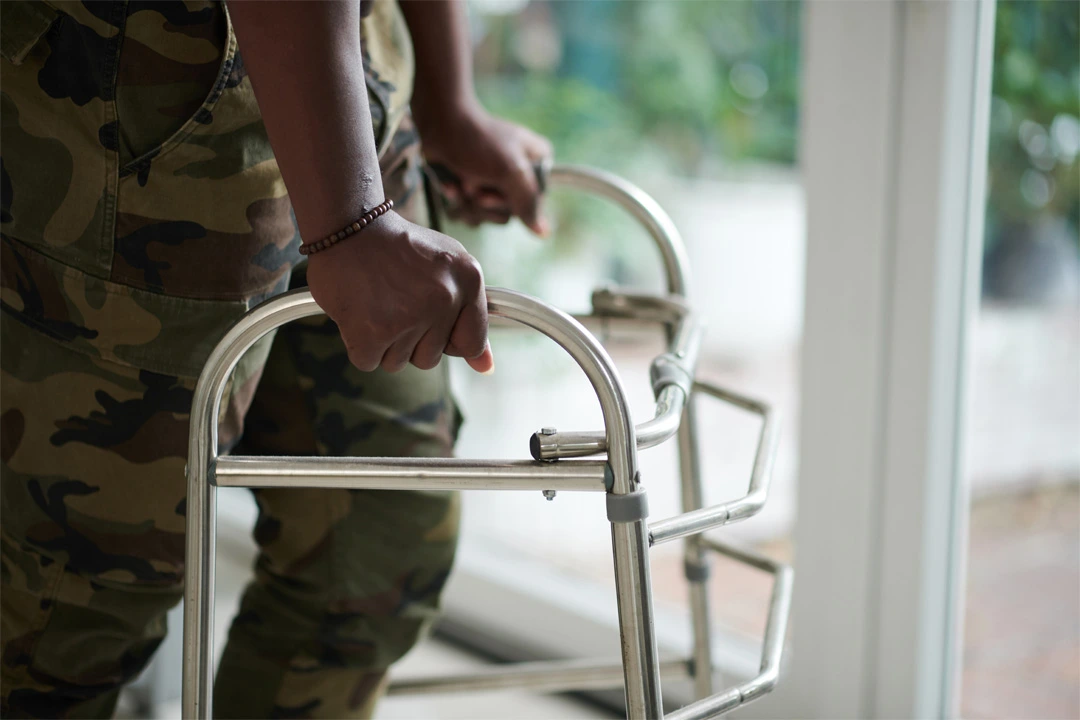Jonathan Finds Motivation with PCA Choice
PCA Choice helps Jonathan stay positive and accomplish his daily tasks

Jonathan hasn’t always lived with a disability. About 14 years ago, Jonathan suddenly lost vision in his left eye. When he visited an eye doctor, he was met with grave concern.
“The doctor looked at my eye and said, ‘This shouldn’t be happening,’” Jonathan said. “‘You’re not old enough to have this happening. I would recommend an MRI.’ So, I got one, and that’s how they found lesions. Through that MRI, they diagnosed me with MS.”
Multiple sclerosis (MS) is an autoimmune disorder of the central nervous system and is highly unpredictable. Some people may only have mild symptoms like fatigue, numbness or tingling, pain, loss of balance and vision problems. Severe cases like Jonathan’s often include weakness or paralysis, vision loss and cognitive difficulties.
“I didn’t get symptoms right away but eventually I had to get on disability, and I couldn’t work anymore,” Jonathan said.
Now 46 years old, Jonathan uses a walker to navigate his home due to the weakness in his body. He has difficulty performing most daily activities such as walking or taking a shower.
“I say having MS is like having no autopilot,” Jonathan said. “I have to think every time I move. ‘Okay, step with the right foot. Now, step with the left foot.’ I don’t just do anything. I have to think about everything I do.”
Getting the Help He Needs with Accra
Jonathan credits his former partner for introducing him to Accra. She was involved in advocacy for service employees at the time and recommended he connect with Accra. Jonathan made the call and has been receiving PCA Choice services for almost a decade and a half now.
With PCA Choice, clients independently recruit, hire and train the home care providers who provide their care. The PCA Choice option gives them a greater level of responsibility in managing their care while Accra assists in handling the employment and management-related functions of their PCA.
Jonathan’s caregivers help him with most of his activities of daily living like cooking, showering, and cleaning his home. Even simple tasks have proven difficult.
“I can’t cook my own meals. I can’t do my own dishes. I even have a hard time carrying a glass of water,” Jonathan said. “I don’t have the stability or the hand eye coordination. If I had to move a glass of water, there’s a 99% chance I will spill it.”
“Since teaming up with Accra, I don’t struggle to get things done. A lot of the time I can ask my caregivers for help,” he said. “I do what I can, but what I can’t, my caregivers do that for me, and I appreciate it.”
A Man of Skill and Service
Jonathan joined the Army in 1996. Trained as an auto mechanic, he served as a combat engineer, a specialized soldier who uses their engineering skills in combat operations to help the army navigate and secure the battlefield.
“I used to be in top physical condition,” Jonathan said. “In basic training, I had the highest PT score out of over 250 people, so I could do 88 push-ups in two minutes, 88 sit-ups in two minutes, and run two miles in 12 minutes and 20 seconds. And that’s with combat boots and a 30-pound backpack. I miss that.”
Because of the progression of his MS, Jonathan was medically discharged in 2014.
“I was honored to serve and the only reason I stopped was because I couldn’t do it anymore, but if there was a way for me to do something like that again, I would,” Jonathan said.
Meaningful Messages
Over the years, Jonathan has taken the time to reflect on his condition and the broader meaning behind it. Instead of feeling defeated, he has chosen to champion the caregivers he hired through Accra.
“A lot of people talk about how caregivers should act and what they should do, but there are few conversations about being a good participant,” Jonathan said. “I am grateful for the people taking care of me. These employees are here to make my life better. I have worked for my share of bad bosses, and I am dedicated to never be one.”
Being in the Army has also taught Jonathan about sacrifice and what it means to be a protector. His experiences shaped his unique outlook on life.
“I believe that there is a finite amount of suffering in the universe, so if you are suffering, that means someone else isn’t. That’s one of the reasons I got into the military,” Jonathan said. “Even though I am disabled, my perspective allows me to be the protector because all I have to do is just stand up and take it. I’m ok with that. I’m glad I can.”
